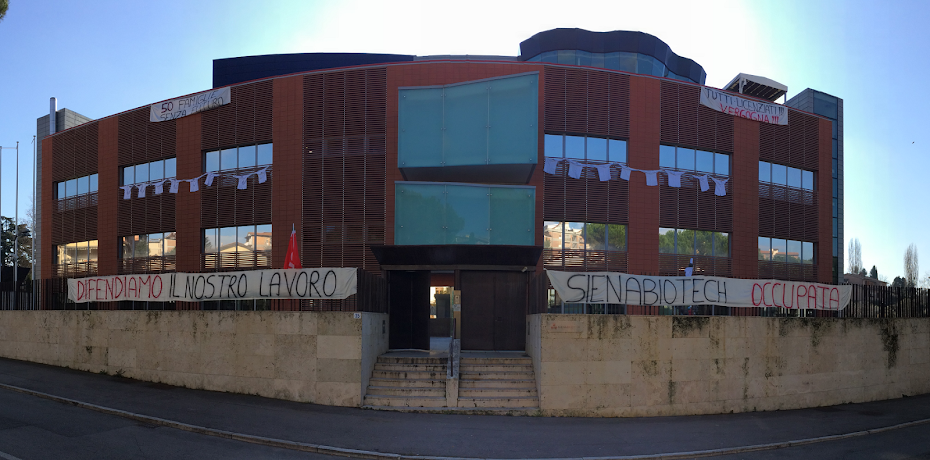We
would like to share with you the situation of Siena Biotech, an
instrumental company of the Monte dei Paschi Foundation (FMPS).
Siena
Biotech was created in 2000 with the aim of bringing to light new therapies for
patients afflicted by neurodegenerative diseases such as Huntington and Alzheimer’s
as well as brain cancer, diseases which today represent a vast unmet medical need
worldwide. Within this vision, and backed economically by FMPS, a modern
Research Center was constructed, equipped with state-of-the art laboratory
facilities and equipment, as recognized by the Nobel Laureate Avram Hersko
during his visit to the Research Center in 2009. He believed it critical to
provide an environment able to attract researchers from all over the globe and,
with the support of an Italian Government program favor the return of talented
Italian scientists working abroad. The investments of FMPS in biomedical
research were fully in line with its statutory objectives and were established
in a geographical location where scientific research has long played out an
important role.
In a
little more than ten years - a relatively short time in the life of biomedical
research projects - Siena Biotech succeeded in generating innovative drugs
progressing to the clinic. The most noteworthy achievement was the drug
Selisistat, developed for Huntington
disease, which reached a phase II trial and was promising enough to be granted
Orphan Drug Designation status by the U.S. Food and Drug Administration and
the FDA and European Agency for the
Evaluation of Medicinal Products.
An
appreciation of the research activities carried out by Siena Biotech during
these years is clearly evident from the international recognition demonstrated
by the fruitful collaborations established with important research
institutions, biotech, and pharma companies (such as Wyeth-Pfizer, Roche, CHDI
Foundation, A*STAR, UCL, EHDN, Telethon, among others), as well as the European
Community, through its granting of several collaborative working programs (Tamahud,
ADIT, DePPICT and Paddington). In the latter Siena Biotech played a leadership
role in the scientific frameworks formed with important academic or private
scientific institutions.
Beginning
in 2012, as a consequence of economic challenges, FMPS found itself unable to
continue its full support of this strategically important investment, thereby
generating an uncertain and precarious environment for the employees of Siena
Biotech. This situation resulted in numerous staff being temporarily laid off,
with Government support. During this period Siena Biotech experienced a drastic
loss of personnel (from 150 to 70 units in less than 2 years), followed by a
radical restructuring which culminated with closure of the oncology department
and dismissal of 14 additional research staff. In spite of these adversities
the research staff continued the planned activities, working on public-funded
projects while fully achieving the goals laid out.
In
2014 FMPS approved a 2-year industrial plan with the ultimate goal of bringing
the company to the point of economic self-sufficiency by building on internal
projects, together with help from external partners and by leveraging
integrated drug discovery platforms to offer research support for client
industrial or biotech companies. At the same time the high cost of Research
Center maintenance (backed previously by FMPS) was to be supported by renting
unused space (created by the reduction in personnel) to companies associated
with the biotech-incubator Toscana Life Sciences, the latter whose role is to
coordinate the emerging local District of Life Sciences.
Unexpectedly,
and just 8 months after FMPS signed the new industrial plan, this investor
decided to halt all further financing and wind up Siena Biotech. As a result, a
procedure of collective employee termination was initiated on February 6 2015.
The research building and its facilities will, however, remain open for the
time being, as this seems to be the principal interest of local politicians and
entrepreneurs. Ironically, economic support will continue from FMPS, its sole
investor.
In
view of the above course of events, we find it hard to believe that the
unexpected decision to close Siena Biotech is in any way related to either the
cost of its scientific activities or lack of results, but is purely politically
motivated. It would clearly seem that FMPS prefers to put value on an
investment in real estate/equipment rather that
in scientific human resources.
Public
attention is increasingly being drawn to a future in which a country’s economic
development is critically linked to technical and scientific innovation and not
held hostage to political considerations. The researchers of Siena Biotech
consider their patrimony of know-how and professionalism an important asset to
be considered for future entrepreneurial businesses and an engine for the development of Life Sciences in Italy.
The
research staff of Siena Biotech




